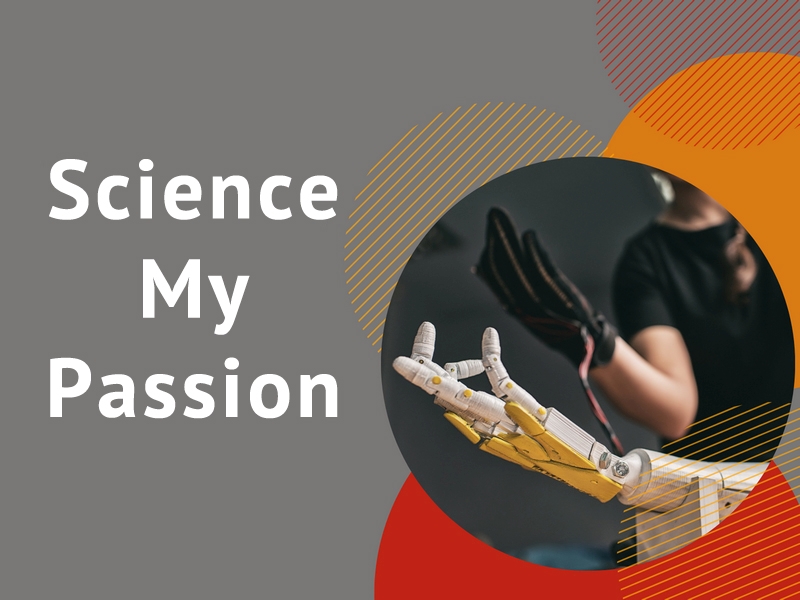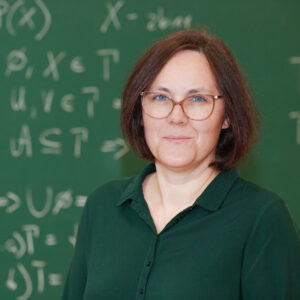Coincidence in mathematics? I think not!
Games are not just entertainment! They are a very serious mathematical problem! The kind that you could write poems about! Anna Brzeska, PhD, writes about her passion for science and its transmission to future generations.
We invite you to a surprising reading.
SCIENCE | MY PASSION
According to the definition taken from the Polish Language Dictionary, science is complete human knowledge arranged into a system of problems, but also a set of ideas that constitute a systematic whole and comprise a specific research field.
Science is also activity: learning and teaching.
Please read the “Science | My Passion” series, where our researchers present their work and show that science and research process can really draw us in.
We’re gonna play a GAME!
Why mathematics?
People say that some talents you just have to be born with, and I was apparently born with the ability to learn maths easily. Apart from my pre-school years, when everyone thought I had a talent for art, throughout my school years maths always came easy to me.
After fifth grade in primary school, I successfully passed the entrance exams in maths leading to sixth grade with – as we would call it today – advanced mathematics. I still remember the subject of my first mathematics lessons at the new school, namely the concept of groups in algebra. Groups are generally taught to first-year university students in mathematics. How, then, did the sixth-year primary school students manage to tackle this topic? Unfortunately, I don’t remember my classmates’ reactions anymore, but I found the topic of groups very interesting. And this was my first contact with abstract mathematics, where you don’t necessarily count, but where you primarily search and explore. The person behind this breakthrough was my mathematics teacher at the time, Ireneusz Janz.
Why studies in mathematics?
Although after completing primary school, I chose to follow a course with an extended curriculum in mathematics and physics in high school, the decision to take up mathematics studies at the university was not so straightforward. In fact, I considered taking the entrance exams for Polish philology, due to my love of listening, reading, creating, and even singing poetry. It so happened, however, that just before my secondary school-leaving exams, a meeting with Professor Mieczysław Kula was organised at my school, who would tell us all about studying mathematics. Besides me, only two people attended the meeting, so it was held at a small table in the school cafeteria. I remember that, in the course of the conversation, it was necessary at some point to establish the time distance between two dates of importance for university admissions. And since I managed to do it quite easily, Professor Kula jokingly said that studying maths would be a good fit for me. And that’s what I ended up doing.
What amazed me about mathematics?
Perhaps mostly what it really is. I had already learned in sixth grade that mathematics is not just about counting, but the side of maths that I learned during my studies in modules such as topology, set theory, and logic was fascinating to me.
And it turned out to be what I liked most about mathematics. Thanks to Professor Aleksander Błaszczyk, whose lectures I had the pleasure (and luck) to listen to, the subject of my master’s thesis, and later my doctoral thesis, was the so-called infinitary combinatorics, which combines elements of set theory, topology, and combinatorics. The notions of the filter and ultrafilter, as well as the so-called compactification of the topological space, accompanied me in my scientific work for many years. Over time, however, other branches of mathematics began to capture my attention. Such as, for example, game theory. My interest in this field developed purely by accident.
One day I found an inconspicuous book on my university desk, “Game Theory and strategy” by Philip Straffin, which had been there by a colleague of mine. In it, I discovered several applications of game theory not only in economics but also in philosophy, psychology, biology, and politics. These topics seemed interesting enough for me to hang on to them a little longer. The result of this infatuation is a module I developed entitled “Game Theory and Its Applications”, which has been offered to mathematics students as an elective lecture for several years.
What do I like about mathematics?
The fact that in maths black is always black and white is always white. When a mathematician poses a question, he or she is capable of answering it in some way. For example, by confirming the hypothesis with an appropriate theorem, or falsifying it with a counter-example. He or she may also come to neither of these conclusions and instead change the assumptions or the formulation of the problem itself. However, a mathematician keeps moving forward in his or her research because he or she always learns a bit more about the issue at hand. Often, while working on a proof for a hypothesis they have set up, mathematicians discover interesting auxiliary properties. This happens especially when mathematicians discuss their ideas with other mathematicians. A discussion about the problem posed and its solution, or even a discussion about the very way of posing the problem, I believe today to be indispensable in the process of teaching mathematics.
And not just the university one. This is why I teach my students to have the courage to make mistakes and to ask seemingly “stupid” questions. Understanding where you went wrong provides a solid foundation for further development, and the memory of a mistake carries with it the memory of correct reasoning.
What do I use mathematics for?
I would not be exaggerating if I said everything. And I am not at all referring to the aforementioned ability to count, say, money, for example. In my opinion, whenever we make choices in life, mathematics comes into play. So, it is not so much counting as the ability to compare and eliminate that seems to me to be crucial here. Game theory defines the concept of an equilibrium point, also called the Nash Equilibrium after John Nash, a mathematician and a Nobel Prize winner in economics. This equilibrium is not just about maximising one’s own winnings, but about a certain optimisation of one’s own strategy while taking into account the other players in the game. Mathematics turned out to be just such an optimal choice for me. And I may return to writing poems at some point, but there is also a good chance that they will have mathematics as their topic.
Thank you for reading this entire post







